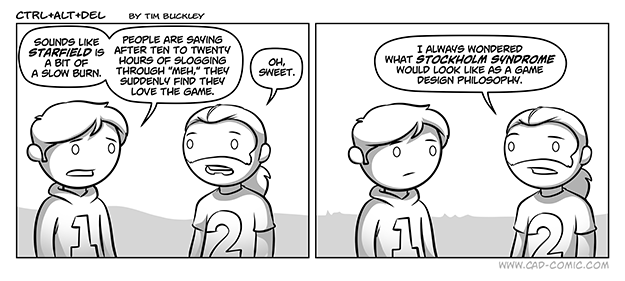Continued…
Leveling: The goal of leveling is achievement. Let’s face it, you put the effort into leveling a character up, you want to show him off. A clear and distinct advancement in power as you increased in levels. And not just in hit points, but in every aspect possible. Levels, privileges, titles, skills, armor, mounts. I’d even want your character’s physical appearance to advance and change through the levels. Similar to how Crackdown did it. Every ten levels or so your character changes in some way. He gets more muscular. He’s an Orc? His horns get a bit longer, sharper, a bit more menacing. You play an Elf? As you advance his fighting stances get more confident, more lethal looking. From a wary peasant taking meek swipes at your opponent, to a seasoned warrior spinning blades with expert timing. Still the character you designed, but visibly more powerful, beyond just the raid-earned armor you’re wearing. You see a higher level player walk by, you’ll know it, without even having to look at his level.
Spheres, similar to Vanguard, would be the road I’d take for advancement. But one step further than Vanguard. Sure, in Vanguard you level up Adventuring, Crafting, Diplomacy independently. But only your adventuring class and level is displayed. I’d want it to be player option which sphere is displayed for his character. If a player chooses to craft, and reaches level 50 as a crafter, he shouldn’t have to walk around as a level 1 warrior, just because he decided adventuring wasn’t for him.
The standard spheres would be available, adventuring, crafting, etc. But I’d like to go beyond that. Forget auction houses. They once again removal the social aspect of the game. Auction houses would be a last resort, with fees high enough to make people question their use. Instead we’d create a Merchant sphere, and zones designated for sales of goods, similar to the Bazaar in EQ. Sure, anyone can hawk their goods, but leveled merchants can do it better, and with more options. As a merchant successfully completes transactions (tracked and recorded with certain filters to make sure the system wasn’t abused), he levels up. Suddenly his /auction shouts reach further. Eventually the merchant can set up vendors (owned NPCs that stand in place with the items available for sale), so he doesn’t have to do the work himself. The higher he levels, the more vendors he can have working at once. The lower his fees are to operate the vendors, the higher his profit is.
The goal would be to create a symbiotic relationship between crafters/artisans, merchants, and the rest of the players. More player interaction.
For adventuring classes, customization would be the focus. Trees and branches of skills within a class. Advancement would be level based, but for every certain number of levels earned, you gain new skills. However, if there are four skills available, you can only choose two. The other two are unavailable to you forever. As two warriors advance, depending on the choices they make their classes become very different, and play differently, with different weaknesses and strengths. In addition, through combat and quests you earn skill points similar to in Jade Empire that can be used to enhance certain features of your skills. You can increase the speed, or damage of a particular skill, making it even more unique.
The entire focus behind leveling is to give as much freedom to the player as possible to create a unique character that is entirely their own, and to feel less like they’re taking someone else’s creation out for a test drive.
Combat: There’s only so much that can be done with combat in an RPG. The very nature of a roleplaying game indicates that you are playing as this character you’d created. It doesn’t matter how fast your reflexes are, your character can only act within the boundaries of his traits and skills. So twitch combat is out of the question as it unlevels the playing field, makes balancing the game nearly impossible.
Little things can keep combat interesting though. Group performed combos like seen in EQ2 and Vanguard are a nice example. Taking things a step further might also be possible, like say, additional requirements to activate a particularly powerful spell or attack. Say you have a super devastating attack that deals massive damage. You press the button to activate it, but then a wheel comes up on the screen, like Wheel of Fortune. It starts spinning super fast, and you click it to stop on whatever entry. On the wheel are things like 2X and 4X damage, or “critical miss” and “guaranteed hit”. The attack is still processed in the system to determine whether or not your character lands the strike, but then your luck of the draw on the wheel is factored in. A miss could turn into a hit. A hit could turn into a miss. A regular hit could turn into a 2X damage hit, if you’re lucky.
Or say you’re a Wizard and you want to activate some devastating spell. You click the button to activate the spell, and your screen darkens a bit, and there are a series of runes on your screen. You’re in concentration mode. You use your mouse (now freed from mouse look) to trace over the intricate runes with your mouse (similar to some of the mini-games in Rayman: Raving Rabids) under a time limit. Your accuracy in tracing over the runes determines the max damage caused if the spell hits.
Obviously this wouldn’t be implemented for every attack or spell, but there are a variety of “mini games” like this that could be implemented to make aspects of combat more interactive, more involved.
That’s enough for today.











